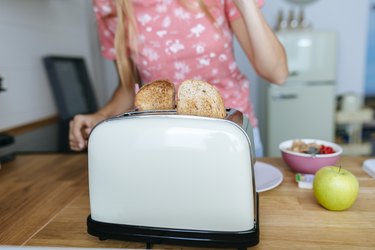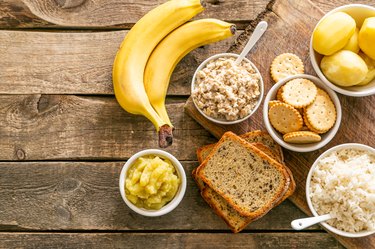
The BRAT diet is an acronym for bananas, rice, applesauce and toast. Boring? Yes. But the meal plan isn't meant to be exciting, nor is it intended for weight loss.
Instead, the BRAT diet was designed to combat uncomfortable digestive problems. Even so, health professionals now consider it outdated.
Video of the Day
Video of the Day
Want to know more? Read on to learn everything you need to know about the BRAT diet, including why people follow it, why experts no longer recommend it and what you should eat instead.
BRAT Diet Basics
Perhaps you're wondering: Why would someone ever limit themselves to eating only bananas, rice, applesauce and toast? The objective of the BRAT diet is to reduce uncomfortable GI symptoms like nausea, vomiting and diarrhea.
The meal plan was traditionally thought to help manage acute bouts of diarrhea because it's made up of low-fiber foods that are 'binding,' explains Tamara Freuman, RD, author of The Bloated Belly Whisperer.
"The belief was that by allowing the gut to 'rest' from the work of processing fiber and including foods that might help firm up stool — applesauce contains pectin and bananas contain resistant starch — it could shorten the duration of a diarrheal episode," she says.
The BRAT diet has also been recommended for people who experienced nausea or vomiting and are beginning to transition back to eating solid foods.
"These foods are considered easy to digest since they're soft textured, bland and low in fiber," explains Freuman.
Related Reading
Why the BRAT Diet Is No Longer Recommended
Despite being on doctors' radars since the 1950s, the BRAT diet is no longer recommended during recovery from vomiting or diarrhea, per a January 2004 article published in Emergency Medicine News. That update stated: "This dietary restriction is a suboptimal choice because it is low in protein, fat and energy content," which does nothing to strengthen the body's healing process or immune function.
Also important: "Actual evidence suggests that it does not shorten the duration of acute diarrheal episodes," says Freuman. "In fact, it is the opposite: Once a person with diarrhea is rehydrated, diarrheal illness appears to be shortened when you begin re-feeding them a normal, nutritionally adequate diet compared to restricting intake for a more prolonged period of time."

The BRAT diet is especially detrimental to individuals who are growing and require adequate energy, including children and pregnant people. Again, it all comes back to the fact that bananas, rice, applesauce and toast don't provide sufficient vitamins and minerals.
"The diet is nutritionally inadequate," Freuman explains. "It lacks adequate calories, protein, fat, fiber, iron, calcium, zinc, vitamin A, vitamin B12 and other key micronutrients."
That's problematic for two reasons. First, inadequate nutrition can actually worsen diarrhea by impairing gut function in the short term. Plus, "over time, malnutrition can impair growth and development [in children]," adds Freuman.
BRAT Diet Alternatives for Diarrhea
If diarrhea is your main issue, there are many adjustments you can make to your diet to help make things more regular.
1. Get Hydrated
Some of the most critical concerns with chronic diarrhea is fluid loss and dehydration. Remember, sufficient body fluid is important for everything from cell function and digestion to temperature regulation and blood pressure control, per Harvard Health Publishing.
Instead of strictly following the BRAT diet after a bad bout of diarrhea, focus on rehydration, says Freuman, who recommends balanced rehydration solutions instead of Gatorade or plain water. She recommends products that are labeled as oral rehydration solutions, such as Pedialyte, Ceralyte or Amazon's Basic Care Electrolyte Solution.
"Oral rehydration solutions contain a precise ratio of water to sugar to salt that maximizes fluid uptake and reduces stool output," she says.
2. Consume Soluble Fiber
Including soluble fiber in the diet can also help relieve diarrhea.
"Soluble fiber forms a viscous, gel-like texture in the gut and helps slow down transit time and create more formed stools," notes Freuman.
Some sources of soluble fiber she recommends:
- Oats
- Papaya
- Pumpkin and peeled/cooked squashes
- Cooked carrots
- Skinless sweet potatoes
- Oranges and clementines
- Bananas
- Peeled apples
- Avocado
- Cantaloupe
3. Limit Insoluble Fiber
While you increase your intake of soluble fiber, it's also a good idea to minimize your consumption of insoluble fiber, which has the opposite effect and speeds up transit through the GI tract.
Insoluble fiber is the roughage found in leafy greens, the thick skins of fruits and veggies, whole nuts, popcorn, wheat bran, whole beans and lentils.
4. Cut Out Sweets
It's also best to curb your sweet tooth if you're dealing with diarrhea.
"Small amounts throughout the day shouldn't be an issue, but larger intakes of sugar in one sitting can draw excess water into the bowel through osmosis and worsen diarrhea," explains Freuman.
Avoid concentrated sources of sugar like juice, sweetened beverages, honey, maple syrup, ice cream and desserts.
5. Stick to Plain and Lean Proteins
High-protein foods tend to be belly-friendly for those struggling with GI issues.
"Plain, lean proteins should be 'GI neutral,' meaning they shouldn't aggravate diarrhea or stimulate the bowel excessively like higher-fat foods can," says Freuman. "Lean chicken, turkey, fish and eggs all provide protein, iron and zinc and are generally well-tolerated and need not be avoided."
BRAT Diet Alternatives for Nausea
There are several ways to alter your diet that can help ease nausea.
1. Invest in Rehydration Solutions
Oral rehydration solutions (ORS) are just as important for chronic nausea that's accompanied by vomiting as they are for diarrhea.
"If you aren't able to hold down larger volumes, take tiny sips," suggests Freuman.
Another option: Freeze ORS into popsicles to help pace yourself with tiny amounts of liquid intake at a time.
2. Add Ginger
Adding ginger to your diet can also help ease nausea and vomiting, thanks to its active compounds like gingerol and shogaols, per a March 2016 review published in Integrative Medicine Insights.
"You can buy ginger chews and candies, steep ginger tea or drink real ginger ales that actually contain ginger, not just ginger flavor," Freuman says.
3. Go Cold
Also, pay attention to temperatures.
"Sometimes cold temperatures are easier to get down than warmer ones and cold or frozen foods also have less of an odor than warm or cooked foods," says Freuman. "This can be helpful for some people who find the smell of foods to be nauseating."
4. Try Liquid
If a solid meal isn't appealing, opt for a smoothie that includes frozen fruit and veggies along with protein-packed additions like Greek yogurt, nuts or nut butters and seeds like chia or flax for a satisfying sip.
Related Reading
The Bottom Line
While only eating bananas, rice, applesauce and toast is no longer advised, the recommendation to keep your plate plain if you're struggling with diarrhea or nausea isn't totally off-base.
"I really don't recommend the BRAT diet, however I certainly recognize that when you are feeling awful and pooping your brains out, it's natural to gravitate toward simple, bland and starchy foods," says Freuman. "I don't know many people who crave giant salads when they've got crampy diarrhea or a steaming pile of spicy, fried chicken wings when they're nauseous."
Eating plain foods for a few days is unlikely to lead to any major nutrient deficiencies for the average, healthy adult, says Freuman. Adults who are nutritionally compromised and most children, however, should avoid following this type of highly restricted diet.
If you're dealing with ongoing GI issues, the best approach is to work with a gastroenterologist or registered dietitian to determine how to safely modify your diet for symptom relief.
Is this an emergency? If you are experiencing serious medical symptoms, please see the National Library of Medicine’s list of signs you need emergency medical attention or call 911.